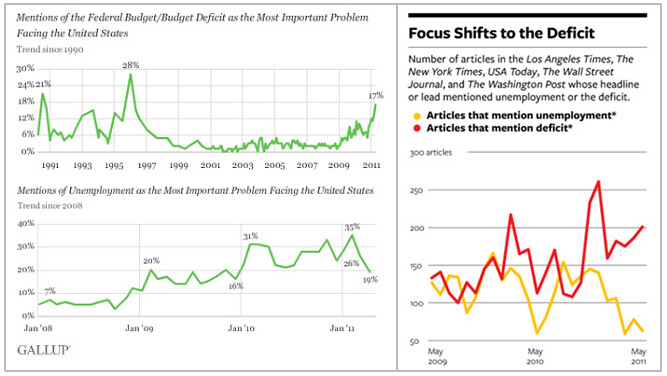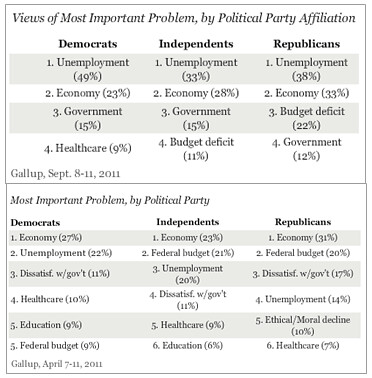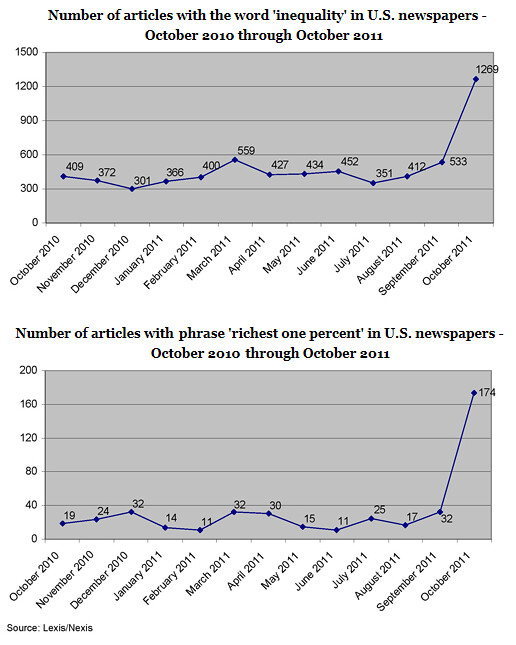The Victory of the Occupy Movement
In the wake of its clashes with police in cities across the country, some media (for example, here and here) are beginning to question whether the Occupy Wall Street (OWS) movement is becoming counterproductive. But lost in those debates is the undeniable victory of the Occupy movement, or at least this first phase of it. As the numbers show, in just a few months OWS has helped transform the national agenda away from the Republicans' cynical focus on budget deficits to putting jobs and America's record high income inequality front and center.
It's worth looking back at a snapshot of the American political discussion at the beginning of the summer. In what must rank among the greatest - and most successful - political double-standards in recent memory, Republicans despite their decade-long debt orgy largely succeeded in replacing the jobs deficit with the budget deficit as the nation's #1 priority.
That triumph of the GOP messaging machine was reflected in an April Washington Post/Pew Research poll. Four months after the Republican majority took control of the House, the percentage of Americans believing the budget deficit was a major problem which must be addressed now had catapulted from 70 percent to 81 percent. But even more revealing is that April Gallup survey (chart below, left) which showed the deficit (17%) rivaling the unemployment (19%) and the overall state of the economy (26%). And as the National Journal revealed in May (chart below, right), the shift from jobs to deficits in American political discourse was reflected in media coverage as well.
(Given that Ronald Reagan tripled the national debt and George W. Bush doubled it again, the GOP's born-again debt crusade seemed more than a little hypocritical. After all, as Dick Cheney declared in 2002, "Reagan proved deficits don't matter." Not, that is, if a Republican is in the White House.)
But in the aftermath of the Republicans' acknowledged debt ceiling hostage-taking, the American people have caught on to the GOP's transparent austerity program. And thanks in part to the Occupy movement, America's persistent unemployment and startling income gap are now beginning, in Nicholas Kristoff's words, to "Occupy the Agenda."
The public's demand for "jobs now, deficit reduction later" is finally being reflected in Republicans' attitudes about the most important issue facing the nation. In sharp contrast to its April survey showing Republicans (and independents) said the federal budget was near the top of their priority list, a September Gallup poll found a dramatic change. In the wake of renewed worries about the fragile recovery, the backlash against the GOP's debt ceiling brinksmanship and the nascent Occupy movement, Gallup discovered "Unemployment Re-Emerges as Most Important Problem in U.S." Even Republicans agree:
As it turns out, the Occupy Wall Street movement combined with the jaw-dropping findings from the Congressional Budget Office (CBO) have shifted the focus to income inequality. While Republicans have blocked President Obama's wildly popular $447 billion American Jobs Act in order to preserve a tax cut windfall for the wealthy, a new poll from The Hill found that "Two-thirds of likely voters say the American middle class is shrinking, and 55 percent believe income inequality has become a big problem for the country."
A quick glance at the media coverage bears that out. As Peter Dreier explained earlier this month, "The Occupy Wall Street (OWS) movement has changed our national conversation."
One can see how Occupy Wall Street has transformed the country's agenda by examining how America's newspapers have covered the movement's concerns and issues.
For example, a search of Lexis/Nexis's database reveals that in October 2010, U.S. newspapers published 409 stories with the word "inequality". As the graphs reveal, each month through September 2011 the number of stories varied little. But in October 2011, the frequency skyrocketed to 1,269 stories.
Even that regurgitator of Washington convention wisdom Politico took notice that "Occupy Wall Street is winning." As Politico also reported, that reality has led to "income inequality...working its way into the discourse of Republicans on Capitol Hill."
That failed Republican policies - especially the Bush tax cuts of 2001 and 2003 - helped fuel the triumph of the 1 percent is completely lost in the GOP's charges of "class warfare", "sowing social unrest and class resentment" and "pitting Americans against each other." Absolutely, there's huge income inequality, and it started right here in Washington," said Rep. Bill Flores (R-Texas). "The way we fix that is getting the government out of the way of the private sector so we can put these people to work." As James Lankford (R-Okla.), a freshman on the Budget Committee brushed off the dramatic widening of the income gap over the past 30 years:
"There's not a single country or time period in history [when] there wasn't income inequality. If we're concerned with 'the wealthy have too much, let's tax them and give it away to those in poverty,' that's the wrong direction. The issue is how can we provide the maximum opportunity for everyone in America to succeed rather than to say, 'Let's take it away from the successful.' It's the balance between equality of opportunity and equality of outcome."
Of course, the House GOP leadership gave away the game in recent speeches. An aide to Eric Cantor, who previously called the Occupy protesters "mobs," revealed his boss would use a speech on income inequality to explain "how we make sure the people at the top stay there." In a much-hyped speech at the Heritage Foundation in October, the budget-slashing Paul Ryan wrongly accused President Obama and the Democrats of pursuing "painful austerity, the kind you see in Europe" which would hinder social mobility. Last week, Ryan picked up the baton of Republican income inequality denialism, producing a laughably feeble response to the CBO's jaw-dropping report.
The Republican reaction, however, is to push the same old tried and untrue talking points -- cutting taxes and regulations will boost small businesses and increase income for everyone, including those at the bottom of the economic scale. And as a mountain of polling confirms, the American people aren't buying it. Recent polls from National Journal and CNN confirm that large majorities support President Obama's American Jobs Act, including its calls for infrastructure spending, aid for first responders, extending the payroll tax cut and raising taxes on wealthier Americans.
The success of what be called Phase 1 of the Occupy movement in helping to redefine America's priorities doesn't mean that the protesters don't run the risk of losing friends and alienating people. (Michael Lind fretted about just that prospect for OWS, which even in "progressive cities like Portland, may end up alienating liberal as well as conservative members of the suburban middle-class majority.") Freed of the myriad complications of taking over physical space, for its Phase 2 the movement might instead choose to "Occupy" at times and places of its choosing, including both major party political conventions, Washington DC on Tax Day, selected shareholders' meeting and other events where its mass presence could dominate the agenda. Just as important, putting forward an "Economic Bill of Rights" could present the political system with demands it must satisfy and give Occupy a measuring stick to gauge its own success. For example, that Economic Bill of Rights could include a "jobs now/deficits later" plank, a constitutional amendment reversing the Citizens United decision and corporate personhood, passage of the DISCLOSE Act, a Tax Fairness bill, a housing market rescue and a 21st century Voting Rights Act to end GOP voter suppression practices, just to name a few.
In any event, as Dreier suggested, "the Occupy Wall Street (OWS) movement has changed our national conversation." But as Churchill famously put it:
"Now this is not the end. It is not even the beginning of the end. But it is, perhaps, the end of the beginning."
And the data show, the beginning has been a victory for Occupy Wall Street.





